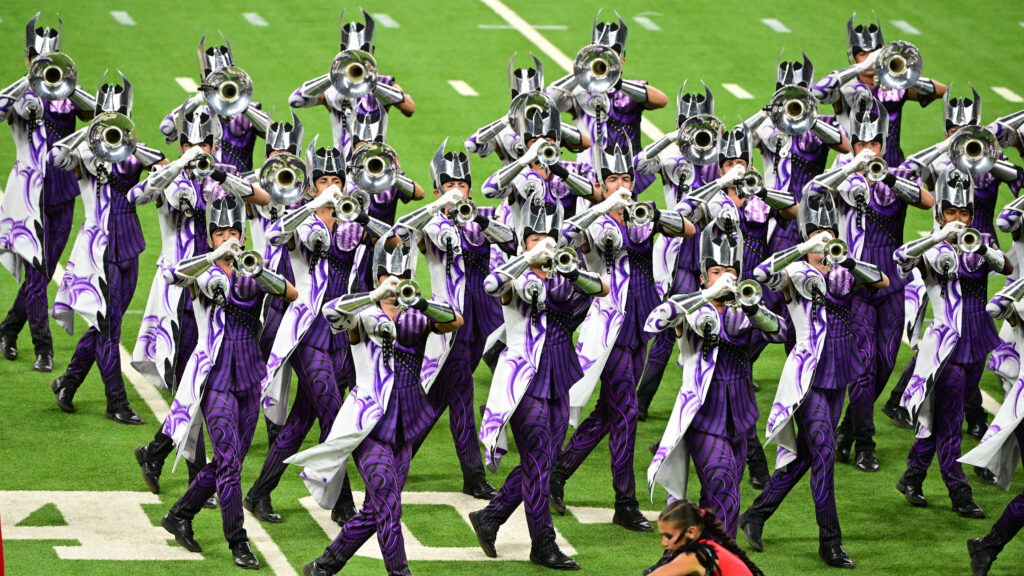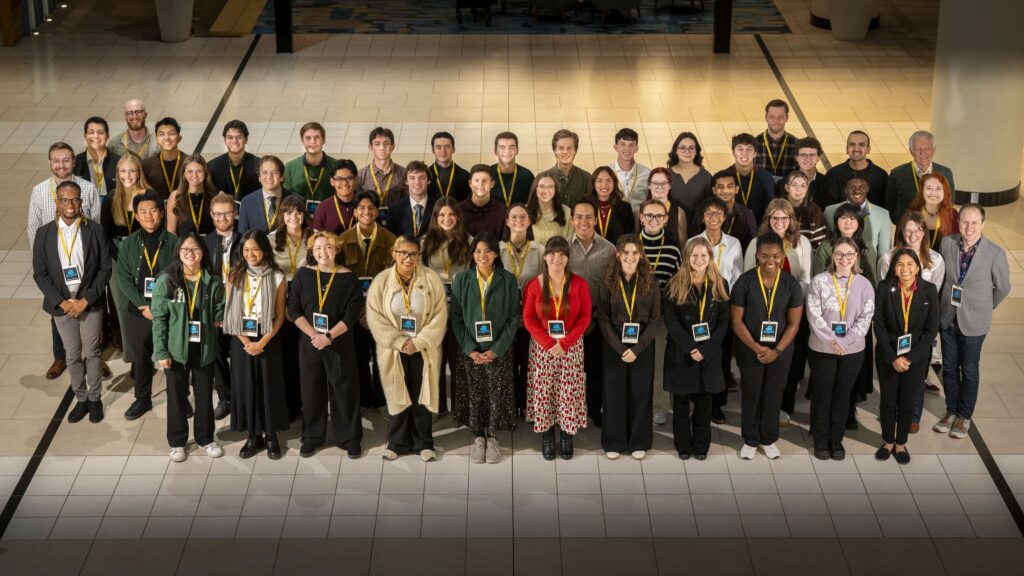David Hill and Michael Heiter are drum corps fans whom have been especially touched by Phantom Regiment, and Jeff Williams marched soprano in the corps from 1996 through 1999. All three have special memories of the corps that will never leave their psyches. According to David, “One of the many satisfactions in watching a drum and bugle corps show is being witness to a goose bumps-inducing performance.
I cleave to the notion that becoming a fan of the activity is in direct proportion to having experienced such an exhilarating moment in the first show you ever attended. “After reading the recounting in ‘Fanfare’ of the 1979 Troopers preliminary performance in my hometown of Birmingham, Ala., I remembered which show, for me, stands as one of the true masterpieces of performance. It was Phantom Regiment’s 1982 version of “Spartacus,” during preliminaries in Montreal’s Molson Stadium. (The prelims site was different from the finals site of Olympic Stadium.) “When you volunteer to work with the activity, as so many of us all know, drum and bugle corps pulses just under the skin. But often you are not able to sit still and simply watch a performance.
It’s when a group of young people so completely master a show that fans, judges, and even volunteers pay undivided attention to the field. “That was the case with this legendary production, during this remarkable performance. In its second year, “Spartacus” could have been a wonderful memory, but in these 12 minutes during prelims, the aura that is Phantom Regiment wrapped around each young performer and lifted the entire corps to listening and viewing delights that don’t happen every performance. “The theme was classic triumph over tragedy, the corps proper provided the powerful sound and moving imagery while the shackled color guard-as-slaves dramatized the struggle and escape to freedom.
“Spartacus” had been a popular setting for the Midwest powerhouse the previous year, so it must have been a seemingly easy decision to bring the music and motion back for an encore. “Phantom’s young people had the technical proficiency, and the show had all the moments written in. So what made this performance legendary, at least in my mind? The curtain rose on the tale from the entrance of the corps to the stadium floor. Setup and warmup set the tone, with the color guard embodying its role as slaves. “It was when the first swell of power and sound rose from the bugles that heads began to turn.
Both musical and visual articulation was vintage Regiment; the emotion of the classic conflict produced an edge, a tension to the presentation. But the legend was made at that precise moment when the color guard literally broke through the shackles to freedom and a wall of musical drama sounded the escape. It was a moment of terminal gooseflesh; eyes welled with tears at the realization that design and execution had, at this moment, become one. “If you were there, in the city of our northern neighbor Canada, with the thousands of us fellow fans, I’m sure you remember this show … this performance, too.
But I have always imagined that the real drama, the truth of the moment, was shared among the 128 members of the Phantom Regiment who produced this legendary moment. Jeff Williams was a rookie in 1996 when the corps won its first Drum Corps International World Championship. But his most memorable moment happened earlier in the season, at Madison, Wisconsin’s Camp Randall Stadium. Jeff remembers that performance well, reminiscing, “I will never forget performing that night in Madison, Wisconsin.
We marched onto the turf of Camp Randall Stadium in the rain. All during warmup, we could tell the weather was threatening to do something, we just didn’t know exactly what or when. As the corps arrived on the starting line — all of the horn line off the field proper and the guard in the center of the field — the sky began to open up. I was drenched through my superman suit. “The longer we waited, the harder the rain came down and we weren’t really sure what was going to happen.
The announcer didn’t say anything for what seemed like 20 minutes. All of a sudden, out of the corner of my eye, I saw some really quick movement near the stands. David St. Angel, our corps director that year, had run down to field level to tell the judges and announcer to get the show on the road. The Regiment would perform! “I don’t remember who the announcer was that night, but as soon as he introduced our conductors, the crowd erupted.
They weren’t quiet enough to hear the four contras start the show with Shostakovich’s “4th Ballet Suite,” but hearing their response helped us all improve our posture by at least 2 inches before the stepoff. Something special was about to happen and hopefully no one in the guard would get hurt due to slippery wet equipment. “As you recall, the “4th Ballet Suite” just built intensity through the entire piece. By the end, the crowd was frenzied and couldn’t wait to scream for us. They were feeding off of us and we were excited by their excitement. The show flowed effortlessly.
We reached the crowd more than in any performance up to that point in the season, and did they ever respond. There must have been a thousand babies on the field. “As we began the 5th Symphony,” our closer, my set was close to the front of the form, but something sounded vastly different from our run-through that day. I couldn’t really hear the timpani. When I had the chance to look, our timpanist was banging away and wiping water off his heads at the same time, water bouncing what must have been 5 feet high with each stroke of the mallet.
Then came the soprano feature of the violin lick and we drilled it. “The crowd was on their feet before we ended the show. When our horns finally came down, the rain stopped. Just like that. I believe we had actually done the show in our “scrubby bubbles” (helmets) without the plumes. Something special happened on the field in Madison that night. We could feel it, but couldn’t put our finger on it. The crowd knew that they had just experienced a moment in life, lasting about 11 minutes, which few will ever experience. “I had a friend that year in Madison Scouts.
He and I were the only two students from tiny Olivet Nazarane University near Kankakee, Ill., marching in DCI that year. That night, he was sitting just below the press box right below the judges. After the show was over that night, he found me by our buses to tell me how amazing our performance was that night. That meant so much to me and later to many in the corps. “We were disappointed in the scoring results that night. After all, we were the only corps to perform in a monsoon. But I guess we made up for it with a relatively good week in Orlando, Fla. 🙂 “As I look at the grander scheme of things, we rose to the occasion because there was some adversity … pouring rain. As successful people and organizations do when they encounter adversity, we stepped up to the plate and took a shot at a great performance.
The crowd loved watching us succeed, which in turn helped us to succeed. “That show was one of about four performances which stick out in my mind from that summer. The first show I remember was our first show in Toledo. My grandma, who made it a financial possibility for me to march, saw my very first show. Three weeks later, she had a major stroke and never fully recovered. “Another show that sticks out in my mind is Allentown, due to the (then) poor condition of the lights and field. The final show that sticks out is our DCI Championship victory performance.
Our Finals show was amazing and loud, but our victory performance was twice as good and three times louder.” Michael Heiter admits to being a “quite ardent fan of the Phantom Regiment,” stating, “I was in Denver in 1978 when they played Santa Clara to a standstill, and then lost on a penalty ‘tick.’ I was also in Kansas City in 1989 when they lost once again to the Vanguard, and I was in Orlando in 1996. “It sort of started with the 1996 quarterfinals, where Phantom placed fourth. After it was over, I went to my hotel room to call my wife. I told her, ‘They’re just going to give it to Concord again.’ (Concord being my shorthand for the Blue Devils.) “The next day, I had a roll of pictures of the Regiment’s performance developed, and drove it to their lodging site for them to review.
The thought being that, since I am not on the 50, perhaps my angle would afford them a view they hadn’t seen from their video. I found them in a meeting just prior to going into the afternoon practice. It was very calm and businesslike, something I’ve always liked about the Regiment and the way I have seen them operate. “The speakers pointed out that a more ‘knowledgeable’ crowd would be there that night, not the curiosity seekers from the night before. They outlined the things they were going to work on, and that was the end of the meeting. As was my tradition, I turned the pictures over to one of the primary staff members, and departed for my return trip to Orlando. “The next day, the morning of finals, I repeated this process.
The Regiment had advanced to third in semifinals. This time, I happened into a staff meeting. Again, the corps was very calm and very direct. “At finals, the corps performed what I thought was a beautiful performance. Then it was time for retreat. My back hurt bad as I had spent the last three nights on the aluminum benches in the Citrus Bowl, and I had to get up at 4:30 the next morning to catch my flight home. I remember thinking, quite clearly, ‘Come on, just give it to Concord and let us all go home.’
I was aware that no corps had won that was lower than second entering finals. “Brandt Crocker, the announcer, mentioned that he was stalling because he didn’t have the scores yet, which struck me as very odd. Having attended 11 previous championships, I had never known an instance where the announcer had not had the scores as soon as the drum majors crept their…
Michael Boo has been involved with drum and bugle corps since 1975, when he marched his first of three seasons with the Cavaliers.
He has a bachelor’s degree in music education and a masters degree in music theory and composition.
He has written about the drum corps activity for over a quarter century for publications such as Drum Corps World, and presently is involved in a variety of projects for Drum Corps International, including souvenir program books, CD liner notes, DCI Update and Web articles, and other endeavors. Michael currently writes music for a variety of idioms, is a church handbell and vocal choir director, an assistant director of a community band, and a licensed Realtor in the state of Indiana. His other writing projects are for numerous publications, and he has published an honors-winning book on the history of figure skating.
His hobbies include TaeKwonDo and hiking the Indiana Dunes. But more than anything, Michael is proud to love drum corps and to be a part of the activity in some small way, chronicling various facets of each season for the enjoyment of others.





